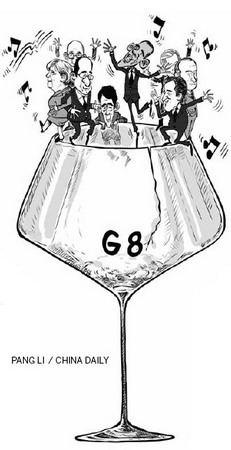Developed countries keen to show united front
Updated: 2013-06-20 07:56
By Chen Xiangyang (China Daily)
|
||||||||
But the G8 summit did show that the developed countries, in particular the G7 (Russia is still considered as an "outsider"), are seeking to "re-activate" and inject new vitality into their old economic, political and security alliance in the face of the collective rise of emerging economies

There are several reasons why the developed countries led by the US are eager to upgrade their economic and security cooperation and coordination.
First, it is the outcome of Washington's renewed strategic rebalancing in its bid to maintain its global supremacy.
The US is striving to reset its global geostrategic layout by rebalancing its "pivot to Asia" strategy, increasing the input of strategic resources into the Atlantic region and paying more attention to its European allies and the Middle East. The high-level personnel changes in Obama's diplomatic and security teams since he secured a second term in office reflect the adjustments in the Obama administration's overseas strategic priorities. The new Secretary of State John Kerry is paying more attention to the EU and the Middle East than his predecessor Hillary Clinton, and newly appointed national security adviser Susan Rice is also focusing more on the EU and the Middle East than her predecessor Tom Donilon.
Second, since 2008, developed countries have been battered by financial and debt crises that have exacerbated domestic political and social conflicts. The US and European countries are attempting to "re-activate" their traditional alliance in order to weather the crises and sustain their economic superiority.
Since President Obama began his second term, the US has been paying equal strategic focus to both the Pacific and Atlantic by simultaneously pushing both the Trans-Pacific Partnership and the Transatlantic Trade and Investment Partnership.
The continued importance the US places on the transatlantic relationship with its European allies was shown by Kerry choosing Europe as the destination for his first overseas trip after taking office and the remarks of US Vice-President Joe Biden at the Munich Security Conference in February, when he said European countries were "America's oldest and our closest allies. And it's hard to imagine a single threat or a single opportunity that cannot be addressed more effectively if we do so together."

 Michelle lays roses at site along Berlin Wall
Michelle lays roses at site along Berlin Wall
 Historic space lecture in Tiangong-1 commences
Historic space lecture in Tiangong-1 commences
 'Sopranos' Star James Gandolfini dead at 51
'Sopranos' Star James Gandolfini dead at 51
 UN: Number of refugees hits 18-year high
UN: Number of refugees hits 18-year high
 Slide: Jet exercises from aircraft carrier
Slide: Jet exercises from aircraft carrier
 Talks establish fishery hotline
Talks establish fishery hotline
 Foreign buyers eye Chinese drones
Foreign buyers eye Chinese drones
 UN chief hails China's peacekeepers
UN chief hails China's peacekeepers
Most Viewed
Editor's Picks

|

|

|

|

|

|
Today's Top News
Shenzhou X astronaut gives lecture today
US told to reassess duties on Chinese paper
Chinese seek greater share of satellite market
Russia rejects Obama's nuke cut proposal
US immigration bill sees Senate breakthrough
Brazilian cities revoke fare hikes
Moody's warns on China's local govt debt
Air quality in major cities drops in May
US Weekly

|

|








